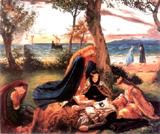
Was Morgan Le Fay really a witch?

Was Morgan Le Fay really a witch?
Geoffrey
of Monmouth tells us that Morgan
Le Fay was the leader of the nine maidens of
Avalon,
who took Arthur away in a barge after the Battle of
Camlann.
The idea is that Morgan is a healer, who will heal Arthur's
mortal wound. William
of Malmesbury, writing just
before Geoffrey, had offered the tantalizing idea that
Arthur's tomb had not yet been found, giving the slight hint
that he was coming back. Geoffrey's portrayal of Morgan (in
the Vita Merlini) would seem to suggest this as well.
Geoffrey also says that Morgan could fly and change
shape. She is largely portrayed as existing for
a long time, the concerns of mortals not having much effect
on her existence. Chretien
de Troyes continues the idea of
Morgan Le Fay as healer, an idea introduced in
Geoffrey
of Monmouth's Vita
Merlini. Chretien also tells us that Morgan is Arthur's
sister, her mother being Igraine
and her father being Gorlois. The Vulgate Cycle finds Morgan still on
good terms with Arthur but angry at Guinevere
for breaking a romance with one of her lovers. She tries
alternately to seduce Lancelot
and to expose his affair with the queen, presumably both
through magical means. In the Prose Tristan, she has
delivered to Arthur's court a magic drinking horn from which
no unfaithful lady can drink without spilling. The tale of Sir Gawain and the Green
Knight ends with the revelation that the entire episode
was a creation of Morgan, who was trying to test the
continued worthiness of Arthur and his knights. After the Vulgate Cycle, writers such as
Malory
said Morgan became angry with Arthur after he kills one of
her lovers. Through magic and mortal means, she tries to
arrange his downfall, most famously when she arranges for
Accolon
to have Excalibur
and try to kill Arthur with it. Malory, especially, portrays Morgan as
mortal, having to use magic to make herself appear young,
and scheming through magical means to embarrass and harm
Arthur and his court. Marion Zimmer Bradley says Morgan (called
Morgaine) was not only Arthur's sister but also his consort
at a Beltane ritual, at which Mordred was
conceived. In Bradley as well as in almost every
Arthurian story, Morgan Le Fay is portrayed as having magic;
many sources say she learned this magic from
Merlin. Was she a witch? That word usually has an
evil connotation. Earlier sources portray her as a healer;
given the evil connotation of the word witch, we must
conclude that she was not one in the earlier sources.
However, in the later stories in which she was portrayed as
scheming to get rid of Arthur and his companions and using
magic to those ends, we must conclude that she was indeed a
witch. See also Literature of the Legends: Robert de Boron Literature of the Legends: Vulgate Cycle Literature of the Legends: Marion Zimmer Bradley and Mary Stewart


Was
Arthur a king or just a battle commander? Was
Guinevere really an adulteress? Was
Morgan Le Fay really a witch? Was
Morgause to blame for all of Arthur's
troubles?

Explorations in Arthurian History and Legends
Main
Page
Other